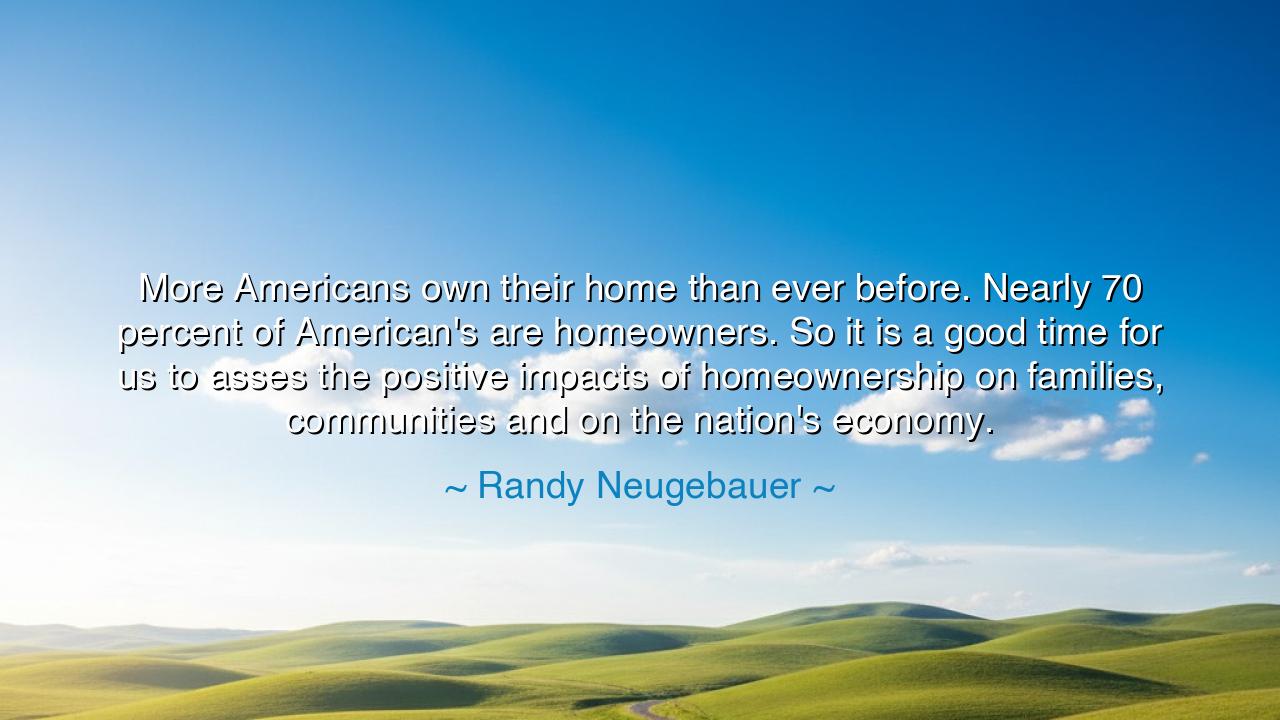
More Americans own their home than ever before. Nearly 70
More Americans own their home than ever before. Nearly 70 percent of American's are homeowners. So it is a good time for us to asses the positive impacts of homeownership on families, communities and on the nation's economy.






The words of Randy Neugebauer, “More Americans own their home than ever before. Nearly 70 percent of Americans are homeowners. So it is a good time for us to assess the positive impacts of homeownership on families, communities, and on the nation’s economy,” are a celebration of stability and rootedness. In them lies the recognition that a home is more than walls and a roof—it is the hearth where families are nurtured, the soil where communities take root, and the foundation upon which nations build prosperity.
In the ancient spirit, the home was always sacred. The Romans worshiped the lares and penates, household gods who guarded the hearth, for they knew that the strength of the Republic lay not only in armies but in stable families. A man who owned land and house was considered a true citizen, bound to the destiny of his city. So too does Neugebauer remind us that when people possess their own dwellings, they feel not only security but responsibility—for their communities, their neighbors, and their nation.
History bears witness in the era following the Great Depression, when Franklin D. Roosevelt’s New Deal sought to restore dignity through programs that encouraged homeownership. To grant a family a house was to restore hope, to anchor them in a future they could call their own. From that moment, ownership was not merely a private blessing but a national strategy, binding prosperity to stability and weaving the individual into the greater fabric of the economy.
Yet Neugebauer’s words also call us to reflection, not just triumph. For while the spread of homeownership strengthens society, it also tests it. When pursued recklessly, as seen before the great financial crisis of 2008, the dream of owning a home was twisted into debt and collapse. Thus, the positive impacts he names are real, but they depend on wisdom, fairness, and foresight. A home can be a pillar of strength or, if corrupted, a burden that shakes the foundations of both families and nations.
So let this wisdom endure: the true measure of homeownership is not only in numbers, but in the flourishing it brings to families, communities, and the economy. A house is wood and stone, but a home is the temple of belonging, dignity, and hope. When a people are secure in their dwellings, they rise stronger as one; when they are denied it, society itself grows restless and fragile. Neugebauer’s words remind us of an ancient truth: that the strength of a nation begins at the hearth.






KYtruong kim yen
While it’s true that many Americans own homes, it’s crucial to examine the broader picture. What does homeownership really mean in terms of social mobility? Are people who own their homes truly better off in terms of wealth and stability, or is homeownership more of a financial burden in today’s economy? How does the rise in homeownership impact renters, and is there a way to make sure everyone benefits from the positive effects of housing, regardless of whether they own or rent?
MHTruong My Hanh
The idea that more Americans are homeowners than ever before certainly sounds encouraging, but I think it’s important to ask who is being left out of this progress. For example, how does the racial wealth gap affect homeownership rates among minority communities? Are the benefits of homeownership as positive for everyone, or is this statistic masking systemic barriers that prevent certain groups from participating in the housing market?
NPNgo Phuc
I agree with Neugebauer’s observation that homeownership has positive impacts on families, communities, and the economy, but I wonder if it’s being idealized. What about the strain homeownership can put on individuals who are struggling with mortgage payments or maintenance costs? Does homeownership still carry the same benefits it did in the past, or are there new challenges that we need to address in today’s economy, such as income inequality and the gig economy?
TATai Anh
The fact that 70% of Americans are homeowners is definitely an achievement, but this raises some important questions. Are the positive impacts of homeownership as widely distributed as they seem? While it may provide stability for some, is there an undercurrent of inequality in who can afford to own? How do we address issues of accessibility and affordability in the housing market, especially in urban areas where housing costs are rising sharply?
AVAnh Van
It’s great to hear that so many Americans own their homes, but I wonder how many of these homeowners are truly benefiting from their investments. The quote speaks to the positive effects on communities and the economy, but is it possible that the housing market has created more problems, such as rising property taxes or lack of affordable housing for new generations? How can we balance the advantages of homeownership with the realities of an increasingly competitive housing market?